Latest News
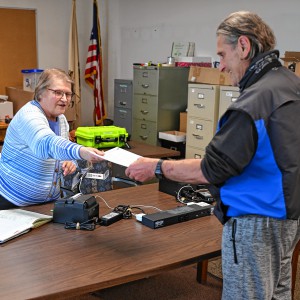 Erving voters say ‘no’ to $3.7M debt exclusion
Erving voters say ‘no’ to $3.7M debt exclusion
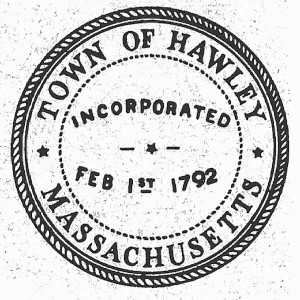 Slew of write-ins elected in Hawley
Slew of write-ins elected in Hawley
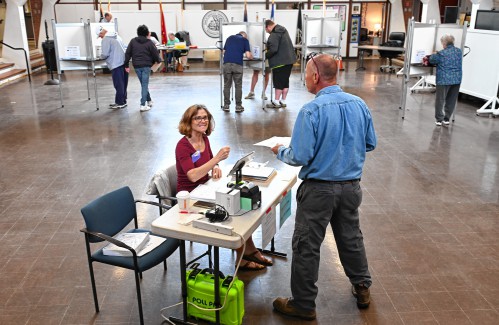
Political newcomer defeats Shores Ness for Deerfield Selectboard seat
DEERFIELD — In the town’s highest-turnout race in at least a decade, political newcomer and longtime resident Blake Gilmore defeated Deerfield political fixture Carolyn Shores Ness, 898-857, for a seat on the Selectboard.Gilmore claimed victory...
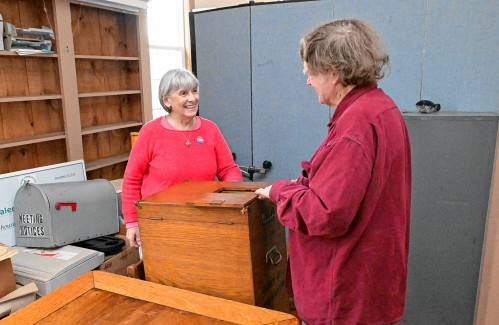
New Salem election ushers in new Selectboard member
NEW SALEM — The town has a new Selectboard member following Monday’s annual town election. Mailande DeWitt, a University of Connecticut School of Law graduate who currently serves as a New Salem Public Library trustee, will fill a two-year vacancy on...
Most Read
 Bridge of Flowers in Shelburne Falls to open on plant sale day, May 11
Bridge of Flowers in Shelburne Falls to open on plant sale day, May 11
 Serious barn fire averted due to quick response in Shelburne
Serious barn fire averted due to quick response in Shelburne
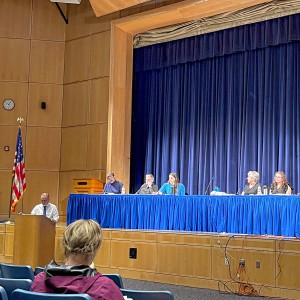 $12.14M school budget draws discussion at Montague Town Meeting
$12.14M school budget draws discussion at Montague Town Meeting
 As I See It: Between Israel and Palestine: Which side should we be on, and why?
As I See It: Between Israel and Palestine: Which side should we be on, and why?
 Greenfield homicide victim to be memorialized in Pittsfield
Greenfield homicide victim to be memorialized in Pittsfield
 ‘We are among the leaders’: Ashfield Town Meeting voters pass bevy of clean energy proposals
‘We are among the leaders’: Ashfield Town Meeting voters pass bevy of clean energy proposals
Editors Picks
 On Mother’s Day, we’ll always have Paris: A crêpe recipe in honor of my French-speaking mother
On Mother’s Day, we’ll always have Paris: A crêpe recipe in honor of my French-speaking mother
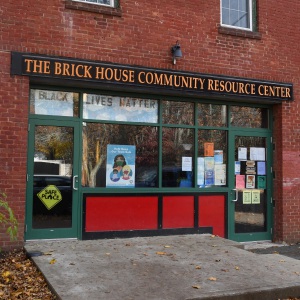 Montague Notebook: May 8, 2024
Montague Notebook: May 8, 2024
 Greenfield Notebook: May 8, 2024
Greenfield Notebook: May 8, 2024
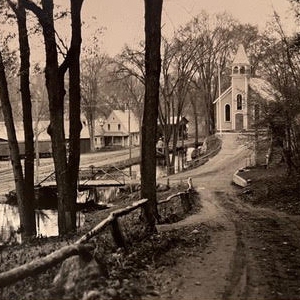 West County Notebook: May 8, 2024
West County Notebook: May 8, 2024
Sports
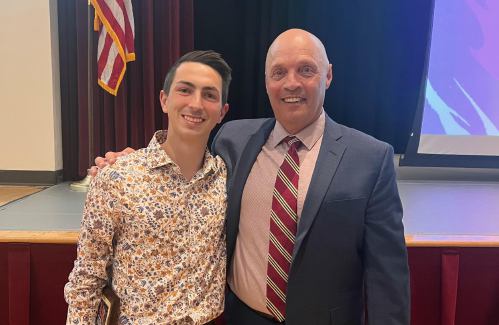
Bulletin Board: Bryce King wins Dean College men’s soccer’s Coaches Award
Dean College’s Bryce King was recognized for his work on the pitch last week. King, an Athol High School graduate, has spent the last four seasons playing on the men's soccer team at Dean, and at the team’s banquet last week, King was presented with...
Opinion
My Turn: Freud — explorer of inner space
My mother often reminded me that “Fools rush in where angels fear to tread” — her words are one of those childhood memories that remain fixed in many a young brain, laid down in the synapses without our knowledge and long before we were capable of...
 My Turn: We all deserve a break
My Turn: We all deserve a break
 Guest columnist Gene Stamell: We know what we know
Guest columnist Gene Stamell: We know what we know
 Michelle Caruso: Questions candidate’s judgment after 1980s police training incident
Michelle Caruso: Questions candidate’s judgment after 1980s police training incident
 Kathy Sylvester: Vote for expertise on May 6
Kathy Sylvester: Vote for expertise on May 6

Business

Fogbuster Coffee Works, formerly Pierce Brothers, celebrating 30 years in business
GREENFIELD — Three decades ago, Sean and Darren Pierce, two brothers in their mid-20s, decided to start selling coffee — a business venture that was funded by a roughly $30,000 mountain of credit card debt.Today, the Greenfield-based Fogbuster Coffee...
 Goddard finds ‘best location’ in Shelburne Falls with new Watermark Gallery space
Goddard finds ‘best location’ in Shelburne Falls with new Watermark Gallery space
 New buyer of Bernardston’s Windmill Motel looks to resell it, attorney says
New buyer of Bernardston’s Windmill Motel looks to resell it, attorney says
 New Realtor Association CEO looks to work collaboratively to maximize housing options
New Realtor Association CEO looks to work collaboratively to maximize housing options
 New owners look to build on Thomas Memorial Golf & Country Club’s strengths
New owners look to build on Thomas Memorial Golf & Country Club’s strengths
Arts & Life

Providing opportunity for people to grow: The United Arc of Franklin County’s annual Gardening with Steve event a highlight of spring
Steve McConley credits his wife, Doreen, for his interest in growing plants. Doreen brought solid gardening skills to their union, and Steve appreciates her encouragement. The McConleys have a garden at their Bernardston home, and now Steve shares...
Obituaries
 Richard Powers
Richard Powers
Richard "Dick" Powers Northfield, MA - On May 2, 2024 Richard "Dick" "Dickie" Powers, 79, passed away at the home of his daughter, with his daughters by his side, following a long battle with vascular and frontotemporal dementia. He was ... remainder of obit for Richard Powers
 Edwin J. Nartowicz
Edwin J. Nartowicz
Northampton, MA - Edwin J. Nartowicz, 100, of Northampton, passed away on Thursday, April 25, 2024, surrounded by his loving family at Cooley Dickinson Hospital. He was born in South Deerfield on November 7, 1923, to the late John and A... remainder of obit for Edwin J. Nartowicz
 Karen R. Adams
Karen R. Adams
Karen R Adams Bernardston, MA - Please join us as we celebrate the life for Karen R Adams on Saturday May 25, 2024, at Mt Toby Friends Meetinghouse located at 184 Long Plain Rd Leverett MA. Service will begin at 11:00 am, please join us ... remainder of obit for Karen R. Adams
 Susan R. Johnson
Susan R. Johnson
Greenfield, MA - Susan R. Johnson, 53, passed away unexpectedly on April 25, 2024. She was born in Gardner, MA on April 26, 1970 the daughter of Rene and Margaret (Ackert) Charette. She enjoyed going to the beach, tanning and art. S... remainder of obit for Susan R. Johnson

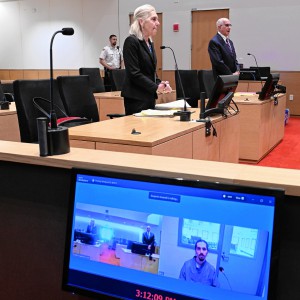 Lawyer argues Joshua Hart’s 2018 conviction for Orange murder had inconsistent verdicts
Lawyer argues Joshua Hart’s 2018 conviction for Orange murder had inconsistent verdicts
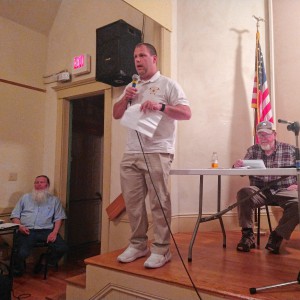 New fire engine gets nod at Warwick Town Meeting
New fire engine gets nod at Warwick Town Meeting
 South County Senior Center opts not to renew church lease after rift over LGBTQ program
South County Senior Center opts not to renew church lease after rift over LGBTQ program
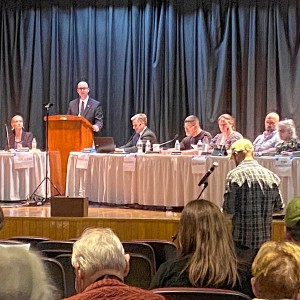 Moratoriums on large-scale solar, battery storage passed in Northfield
Moratoriums on large-scale solar, battery storage passed in Northfield
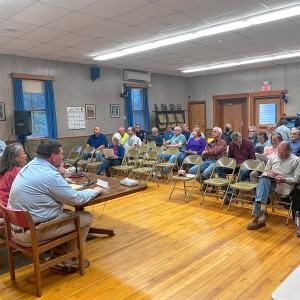 Gill voters OK road discontinuance, change of 2 positions from elected to appointed
Gill voters OK road discontinuance, change of 2 positions from elected to appointed
 Bernardston election ushers in new Selectboard member
Bernardston election ushers in new Selectboard member
 Boys volleyball: Carey twins help power Frontier past Belchertown in straight sets (PHOTOS)
Boys volleyball: Carey twins help power Frontier past Belchertown in straight sets (PHOTOS) Baseball: Logan Moore holds Smith Academy to one hit in Mohawk Trail’s 1-0 victory (PHOTOS)
Baseball: Logan Moore holds Smith Academy to one hit in Mohawk Trail’s 1-0 victory (PHOTOS) Swayman stops 38 shots, Bruins roll past Panthers 5-1 for 1-0 series lead
Swayman stops 38 shots, Bruins roll past Panthers 5-1 for 1-0 series lead Softball: Ainslee Flynn’s walk-off hit lifts Greenfield past Hampshire in 10-inning thriller
Softball: Ainslee Flynn’s walk-off hit lifts Greenfield past Hampshire in 10-inning thriller Speaking of Nature: Capturing my Bermuda nemesis: The Great Kiskadee nearly evaded me, until I followed its song
Speaking of Nature: Capturing my Bermuda nemesis: The Great Kiskadee nearly evaded me, until I followed its song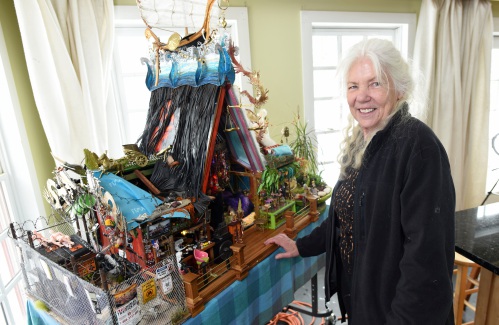 The house that therapy built: Multimedia artist Lisa Winter to display “My House” at the Wendell Meetinghouse this Sunday
The house that therapy built: Multimedia artist Lisa Winter to display “My House” at the Wendell Meetinghouse this Sunday Fun Fest returns to Turners Falls: Música Franklin hosts 6th annual family-friendly, free event, May 11
Fun Fest returns to Turners Falls: Música Franklin hosts 6th annual family-friendly, free event, May 11 Valley Bounty: Delivering local food onto students’ plates: Marty’s Local connects farms to businesses
Valley Bounty: Delivering local food onto students’ plates: Marty’s Local connects farms to businesses
